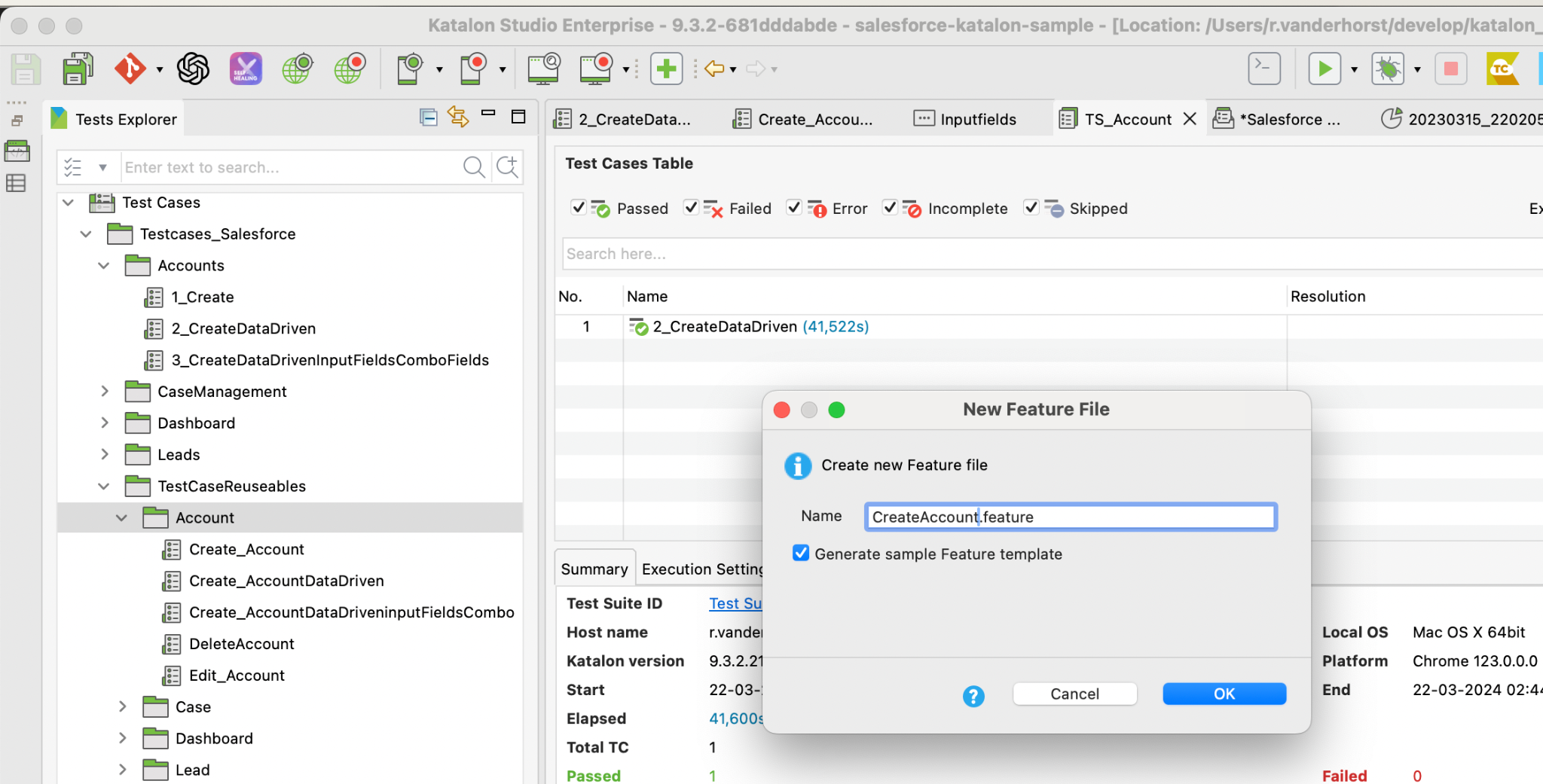Module 5: Advanced testing techniques
Advanced testing techniques
Advanced testchniques with Katalon studio
Advanced testchniques with Katalon studio
Katalon Studio is a powerful and versatile automated testing solution that supports a wide range of testing types, including web, API, mobile, and desktop applications. Leveraging its advanced features and techniques can significantly enhance your test automation strategy. Here are some advanced test automation techniques in Katalon Studio and some you already have learned
1. Data-Driven Testing
Data-driven testing allows you to run a series of tests with different input values without writing multiple test cases. This is achieved by externalizing test data into data files (Excel, CSV, or databases) and then using Katalon Studio to iterate over the data. This technique improves test coverage and efficiency, especially for scenarios requiring extensive validation across different datasets.
2. Page Object Model (POM)
The Page Object Model is a design pattern that creates an abstraction layer between your test scripts and the page’s UI. By implementing POM, you create classes representing pages or components of your application, encapsulating the UI elements and interactions within these classes. This approach enhances test maintenance, reduces duplication, and improves the readability of your scripts.
3. Custom Keywords
Custom keywords extend Katalon Studio’s built-in keywords to provide reusable, project-specific functionality. They allow you to encapsulate and abstract complex actions or frequently used sequences of steps into single, reusable methods. This not only makes your tests easier to write and read but also simplifies maintenance by centralizing logic.
package com.yourcompany.salesforce
import com.kms.katalon.core.annotation.Keyword
import com.kms.katalon.core.webui.keyword.WebUiBuiltInKeywords as WebUI
import com.kms.katalon.core.model.FailureHandling
import com.kms.katalon.core.webui.exception.WebElementNotFoundException
public class SalesforceHelper {
/**
* Waits for an element to be clickable and then clicks on it.
* @param testObject The test object representing the UI element.
* @param timeout The timeout period to wait for.
*/
@Keyword
def clickWhenClickable(TestObject testObject, int timeout) {
try {
WebUI.waitForElementClickable(testObject, timeout, FailureHandling.STOP_ON_FAILURE)
WebUI.click(testObject)
WebUI.comment("Clicked on the element: ${testObject.getObjectId()}")
} catch (WebElementNotFoundException e) {
WebUI.comment("Element not found: ${testObject.getObjectId()}")
throw e
} catch (Exception e) {
WebUI.comment("Exception occurred while clicking on the element: ${testObject.getObjectId()}")
throw e
}
}
// You can add more helper methods here for other repetitive actions in Salesforce, like filling out forms, navigating through menus, etc.
}
When using this custom keyword
import static com.yourcompany.salesforce.SalesforceHelper.*
import com.kms.katalon.core.webui.keyword.WebUiBuiltInKeywords as WebUI
// Navigate to Salesforce or a specific part of the application
WebUI.openBrowser('https://login.salesforce.com')
WebUI.setText(findTestObject('Page_Login/input_Username'), 'your_username')
WebUI.setEncryptedText(findTestObject('Page_Login/input_Password'), 'your_encrypted_password')
clickWhenClickable(findTestObject('Page_Login/button_Login'), 10)
4. BDD Testing with Cucumber
Behavior-Driven Development (BDD) integrates with Katalon Studio via Cucumber, allowing you to write tests in natural language that business stakeholders can understand. This approach fosters collaboration between developers, testers, and business analysts, ensuring that all parties have a clear understanding of the project’s goals and requirements. Katalon supports Gherkin syntax and integrates with the Cucumber framework to execute BDD tests.
5. Parallel Execution and Cross-browser Testing
Katalon Studio supports parallel test execution and cross-browser testing out of the box. This feature allows you to run the same tests simultaneously across different environments, browsers, or devices, significantly reducing the overall test execution time and ensuring your application works consistently across various platforms.
6. Integration with CI/CD Pipelines
Katalon Studio integrates seamlessly with popular CI/CD tools like Jenkins, Bamboo, and TeamCity. This enables you to automate the entire testing lifecycle, from code check-in to deployment. Incorporating Katalon tests into your CI/CD pipeline ensures that tests are run automatically, making it easier to detect and fix issues early in the development process.
7. API and Services Testing
Katalon Studio provides comprehensive support for API testing, including RESTful, SOAP, and other web services. You can test APIs independently or as part of integrated UI tests. Katalon Studio supports various types of authentication, request types, and validation of responses, enabling you to thoroughly test your application’s backend.
8. Visual Testing
For applications where the UI’s appearance is critical, Katalon Studio integrates with visual testing tools to automate the detection of visual regressions. By comparing screenshots of UI elements or whole pages over time, visual testing can identify unintended changes or discrepancies, ensuring the application’s visual aspects remain consistent across versions.
9. Mobile Testing (Appium Integration)
Katalon Studio supports mobile testing for both Android and iOS platforms by integrating with Appium. This allows for the automation of native, hybrid, and mobile web applications. You can develop and execute tests on simulators, emulators, and real devices, covering a wide range of mobile testing scenarios.
By mastering these advanced techniques, you can maximize the effectiveness of your test automation efforts in Katalon Studio, leading to more reliable, maintainable, and efficient testing processes.


